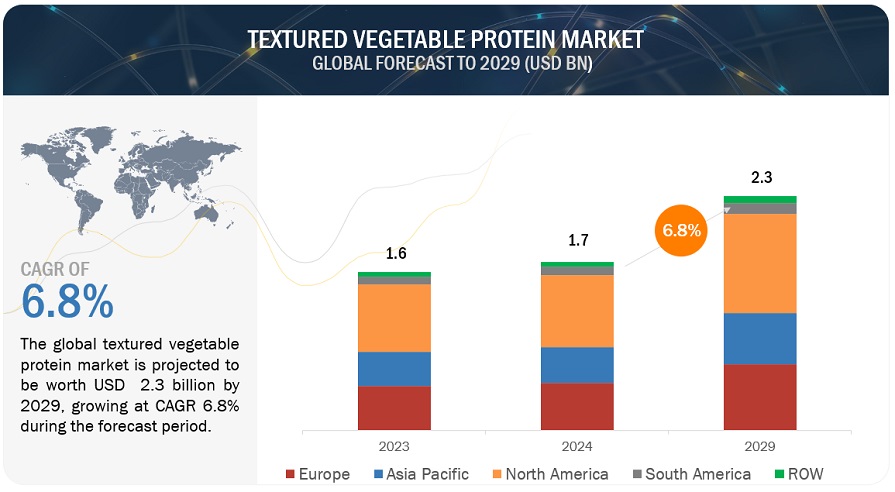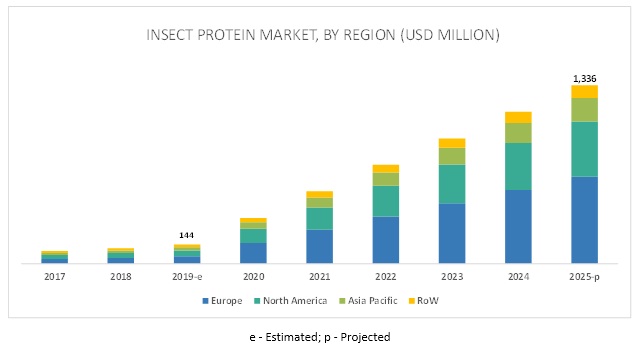The growing demand for meat alternatives, as well as the increase in health awareness among consumers, are propelling the demand for textured vegetable protein.
According to MarketsandMarkets, the "Textured Vegetable Protein Market by Application (Meat alternatives, Cereals & snacks, Others), Form, Source (Soy, Wheat, and Peas), Type (Slices, Flakes, Chunks, and Granules), and Region - Global Forecast to 2025", the market size is estimated to be valued at USD 1.1 billion in 2020 and is projected to reach USD 1.5 billion by 2025, recording a CAGR of 6.2%, in terms of value. The changing consumer preference and interest in vegetable protein sources, due to its nutritional profile, inclination toward clean eating, rise in health concerns, and environmental concerns, as well as animal welfare, have resulted in the growth of the alternatives, such as plant-based meat, and ingredients such as textured vegetable protein.

Drivers: Growing adaption of meat alternatives among consumers
Textured vegetable protein obtained from various sources such as soy, wheat, and pea has been adaptive among the food manufacturers, as it poses as a meat alternative with functional and nutritional characteristics. Also, it has witnessed high rates of adoption among consumers, as it replicates the characteristics of meat products, such as sausages, burger patties, nuggets, and crumbles, with a similar texture and flavor. Meat alternatives contain protein from plants and are formulated to providing an option for non-meat consumers. Flexitarians have been actively working to reduce meat consumption in their diets and are emerging as a larger potential consumer segment. This has increased the production of meat alternatives that closely match the consumer eating experience of beef, chicken, and other animal-based products.
Download PDF Brochure: https://www.marketsandmarkets.com/pdfdownloadNew.asp?id=264440297
According to Animal Legal Defense Fund, in the US, every year, more than 9 billion animals are raised and killed on factory farms. The factory farm system has contributed to a range of problems, from increasing antibiotic resistance to the climate crisis. The consumer inclination toward meat alternatives can mitigate animal-sourced food to a huge percentage. Meat alternative manufacturers, such as Beyond Meat (US) and Impossible Foods (US), have witnessed a surge in sales of meat alternatives, due to a shortage of beef and pork during the COVID-19 pandemic. Beyond Meat (US) reported its first-quarter net revenue spike of 141 % to more than USD 97 million in 2020, compared to the previous year USD 40 million in 2019.
Opportunities: Economical & Environment-friendly substitute to animal-sourced food products
Considering the growing health awareness among consumers, various food products such as meat patties and sausages are being replaced by plant-based/plant-infused meat products, which is expected to have a positive impact on the demand for plant-based protein. According to The Food Science and Health Database Organization, in 2018, “22 million UK citizens now identify as being a ‘flexitarian,’ viewed not as a fad diet, but a permanent lifestyle choice, notably most popular among highly influential millennials.” Thus, the increasing vegan and flexitarian population is projected to drive the textured vegetable protein market during the forecast period. Increased soy and wheat crop cultivation in developing regions such as South America and the Asia Pacific has augmented the widespread cultivation of soybean and wheat grains across the globe, resulting in the availability of soy and wheat products such as textured vegetable proteins.
The slices type segment is projected to account for a major share in the textured vegetable protein market during the forecast period
By type, the textured vegetable protein market is dominated by slices. Textured vegetable protein slices are obtained by processing various beans with higher protein content. They are the unique source of protein that contains essential amino acids, protective ingredients, minerals, and vitamins, which are necessary for total metabolism. During adequate heat treatment, the anti-nutritive factors are removed, thereby improving the protein content. They are generally characterized by structural integrity, which remains the same during hydration and heat treatments.
Request for Customization: https://www.marketsandmarkets.com/requestCustomizationNew.asp?id=264440297
The North American region is the largest in the textured vegetable protein market during the forecast period.
The textured vegetable protein market is driven by the rise in the detrimental effects of conventional meat production and health concerns among consumers. This has increased the demand for meat alternatives and advancements in the research & development activities to substitute traditional meat products. The North American textured vegetable protein market is led by its various applications with respect to sustainability. Advancements in ingredient development have helped improve the adaptability of textured proteins for a wide range of food applications and are estimated to drive growth in the region. The North American region is the largest market for textured vegetable protein, owing to the development of novel and superior quality meat alternatives, developed technologies, and higher consumer adaption to meat alternatives. The increase in processed and convenience food production and innovations in segments such as meat alternatives and cereals & snacks drives the demand for textured vegetable protein in the North American region.
This report includes a study on the marketing and development strategies, along with the product portfolios of leading companies. It consists of profiles of leading companies, such as ADM (US), Cargill (US), CHS (US), Roquette Freres (France), DuPont (US), Wilmar International (Singapore), The Scoular Company (US), Puris Foods (US), VestKorn (Norway), MGP Ingredients (US), Beneo GmbH (Germany), Shandong Yuxin Bio-Tech (China), FoodChem International (China), Shandong Wonderful Industrial Group (China), Axiom Foods (US), AGT Food & Ingredients (Canada), Sun NutraFoods (India), Crown Soya Protein Group (China), La Troja (Spain), and Hung Yang Foods (Taiwan).
About MarketsandMarkets™
MarketsandMarkets™ provides quantified B2B research on 30,000 high growth niche opportunities/threats which will impact 70% to 80% of worldwide companies’ revenues. Currently servicing 7500 customers worldwide including 80% of global Fortune 1000 companies as clients. Almost 75,000 top officers across eight industries worldwide approach MarketsandMarkets™ for their painpoints around revenues decisions.
Our 850 fulltime analyst and SMEs at MarketsandMarkets™ are tracking global high growth markets following the "Growth Engagement Model – GEM". The GEM aims at proactive collaboration with the clients to identify new opportunities, identify most important customers, write "Attack, avoid and defend" strategies, identify sources of incremental revenues for both the company and its competitors. MarketsandMarkets™ now coming up with 1,500 MicroQuadrants (Positioning top players across leaders, emerging companies, innovators, strategic players) annually in high growth emerging segments. MarketsandMarkets™ is determined to benefit more than 10,000 companies this year for their revenue planning and help them take their innovations/disruptions early to the market by providing them research ahead of the curve.
MarketsandMarkets’s flagship competitive intelligence and market research platform, "Knowledgestore" connects over 200,000 markets and entire value chains for deeper understanding of the unmet insights along with market sizing and forecasts of niche markets.
Media Contact
Company Name: MarketsandMarkets
Contact Person: Mr. Aashish Mehra
Email:Send Email
Phone: 18886006441
Address:630 Dundee Road Suite 430
City: Northbrook
State: IL 60062
Country: United States
Website: https://www.marketsandmarkets.com/Market-Reports/textured-vegetable-protein-market-264440297.html























